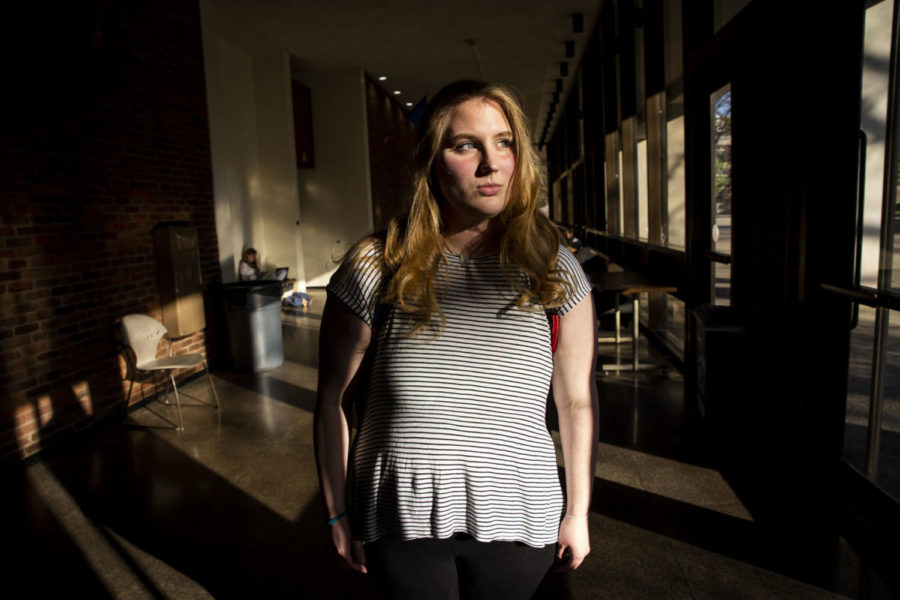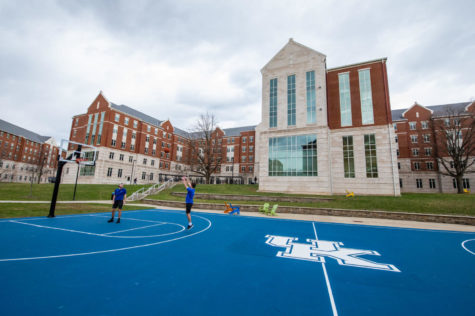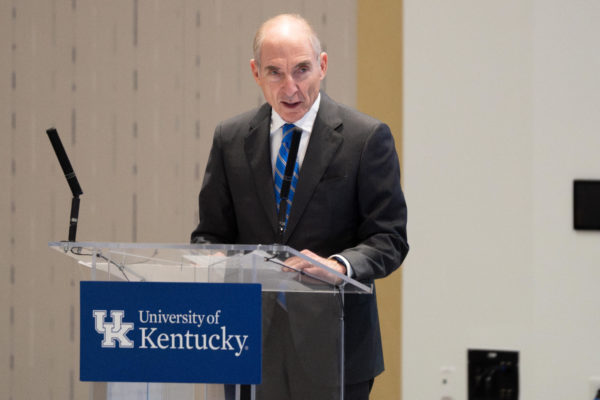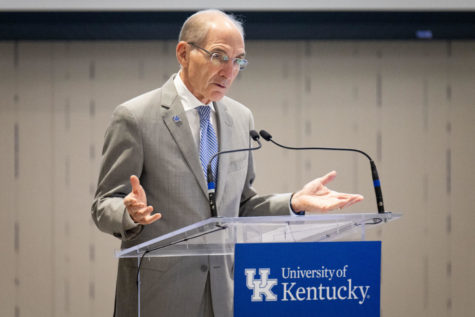Katie Mount works hard to break out of poverty
Katie Mount, pictured in White Hall classroom building, is a junior history major at the University of Kentucky. Mount worked 50-60 hour weeks last summer to pay her tuition and for her food and rent. She continues to work full time while attending classes to pay her bills.
April 19, 2019
The American Dream tells people that no matter where you come from or what your circumstances are, you can break out of poverty and achieve anything you want in life. There are several real-world examples where this story has come to life, but for a lot of people, it is a dream more easily said than done.
Katie Mount is a junior history major at the University of Kentucky. Since her childhood, she and her family have struggled to make ends meet and be able to afford the basic necessities of life.
PART ONE: Drew Van’t Land supports his family on a grad student salary
PART TWO: Saturn X want to be their true self, but it comes at a high price
“My family has always been very poor,” Mount said. “That’s been a reality my entire life. I had two siblings, my mom was a single mom who didn’t finish high school, my dad killed himself when I was 10. We were really destitute. It was just our life…poverty was in my blood.”
Over the course of the last semester, through the Basic Needs Campaign and the SSTOP Hunger movement, students on campus have been putting intense pressure on campus administration to provide more resources for students struggling with hunger and homelessness.
The demonstrations and strikes that continuously popped up on campus brought attention to the question of what role a university should play in the lives of students in terms of providing for their needs.
Mount attended a SSTOP HUNGER general assembly in late March with her classmates and friends to support the Basic Needs Campaign, a plan to pressure universi. Though not a participating member of SSTOP, Mount was pushed to share her story of working more than full time and not being able to afford to eat and attend school at the same time.
“I just went to the general assembly because I have friends in SSTOP,” Mount said. “Next thing you know, I just offhandedly mentioned that last summer I worked 50, 60 hour weeks, and then I got asked if someone wanted to share my story. I think it’s not right for that. It’s gotta come out of the horse’s mouth.”
Continuously rising tuition costs, expensive housing options and meal plans that offer too few meals for combined with scholarship options that require a certain amount of credit hours and a high GPA keep many students like Mount working and going to school full time while still not being able to afford to eat every single week.
“I’m first generation, so just getting here was a lot,” Mount said. “Paying for a freshman dorm was just ridiculously expensive. It’s obscene, and there’s just no way that my family could continue to afford that for three more years.”
“My grants, my scholarships, everything…was almost gone after my first year. I had to work all year long in addition to working for the university. What I spend on groceries now does not even come close to the meal plan my freshman year.”
In the month of January, Mount spent two days per week on campus with a fully packed schedule of classes. The rest of the week, she worked over full time at her job. After paying off her school expenses and rent for the semester, she was able to budget $20 for groceries for the month.
“I lost 10 pounds in January,” she said. “Not because I worked out, not because I dieted, only because I could barely eat anything. I couldn’t afford it and there was no way I could have asked my family for help…if I went to the university to help, they sent me in a whole circle for resources that didn’t help nearly enough. There are too many hungry students here for the resources we have now to suffice.”
When SSTOP Hunger began a hunger strike in late March, many students like Mount began to disagree with the tactics the group took to achieve their goals.
“They have a good message, but that hunger strike pissed me off,” Mount said. “Those kids can choose to stop starving whenever they want and go back to their lives of eating like a normal, healthy human. I don’t have that option. I’m stuck being hungry. There are so many like me too.”
A lot of controversy has come up about the Basic Needs Campaign across social media. Several opponents suggest that the students who are struggling to receive food and housing should be looking for work to cover the differences.
Mount is one of the majority of students struggling to make ends meet with giving up a lot of free time to study, go to school and work. Despite what several opponents believe, it is not always possible to do everything and be able to afford to live.
“I work full time, I go to school full time, I study to keep my scholarships and I cannot afford food all the time,” Mount said. “I had to miss work for a week because I got so sick for not eating. I don’t have health insurance. The university provides basic care but they won’t cover the cost of my medicine.”
“I came to college to get out of the poverty that I came from,” Mount said. “I came to college to rise above that. It’s a constant cycle that keeps putting me down because it’s difficult to afford.”
Mount said she’s still having to justify the cost of groceries, but she’s worked herself “up to one meal a day,” but she can’t convince herself “that food is an expense worth the money it costs.”
“I want to get out and be successful but I can’t take an unpaid internship at all,” Mount said. “I’d love to, but the system keeps me and people like us out of the running for success.”



















































































































































